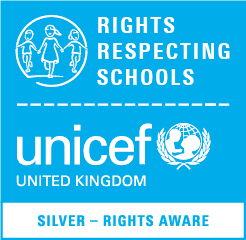Unicef Rights Respecting School & Protected Characteristics

Charlton Primary School has now received the ‘Silver: Rights Aware’ certificate in the UNICEF Rights Respecting Schools Award (RRSA). The Award recognises our achievement in putting the United Nations Convention on the Rights of the Child into practice within the school and beyond, acknowledging that children’s rights are learned, understood and lived in our school. This aligns well with our ethos, equality work and vision, by putting children’s rights at the heart of our school.

UNICEF was particularly impressed with the children’s understanding of their rights and passion with which they upheld thes. The visitors observed the children of Charlton speaking impressively about the right to be treated fairly, to be kept safe from harm, to have a healthy environment and to have a meaningful education. We were also praised for Charlton’s ‘positive relationships that are central to the school’s ethos’ and our ‘good practice in providing opportunities for a diverse group of children to be at the heart of decision-making influencing and shaping the life and work of the school’.
We are now building on this fantastic work by working towards our GOLD award. This will involve a greater focus on citizenship and the children’s role in standing up for the rights of children locally and globally. Our new Rights Champions will be central in making this happen.
Using the UN Convention on the Rights of the Child (UNCRC) as our guide, we are working with more UK schools than almost any other organisation. Over 1.6 million children in the UK go to a Rights Respecting School and nearly 5,000 schools up and down the country are working through the Award. Schools work with us on a journey to become fully Rights Respecting.
Promoting the Protected Characteristics
We work to ensure that our children understand that:
There are no 'outsiders' at our school
Everyone is different
We celebrate our differences
We are all equal in our differences
The Equality Act became law in 2010. It covers everyone in Britain and protects people from discrimination, harassment and victimisation. Everyone in Britain is protected. This is because the Equality Act protects people against discrimination because of the protected characteristics that we all have. Under the Equality Act, there are nine Protected Characteristics:
- Age
- Disability
- Gender reassignment
- Race
- Religion or belief
- Marriage or civil partnership
- Sex
- Sexual orientation
- Pregnancy and maternity
Under the Equality Act you are protected from discrimination:
- When you are in the workplace
- When you use public services like healthcare (for example, visiting your doctor or local hospital) or education (for example, at your school or college)
- When you use businesses and other organisations that provide services and goods (like shops, restaurants, and cinemas)
- When you use transport
- When you join a club or association (for example, your local tennis club)
- When you have contact with public bodies like your local council or government departments
The 9 Protected Characteristics are actively promoted in school through:
- Our school ethos
- Our school core values
- Our school behaviour policy
- Conscious role modelling by all adults in the school community
- Active engagement and communication with parents and carers
- Assemblies
- British Values themes which are threaded through our curriculum
- Discussion within curriculum subjects, taking a cross-curricular approach
- Promoting articulation by building appropriate language and a coherent vocabulary
- Personal, Social, Health and Economic education (PSHE) sessions
- Religious Education (RE) lessons, RSE lessons and Protected Characteristic talks
- Sporting, Art and Cultural Events
- Pupil Voice
- Educational visits
- Real-life learning outside the classroom
- Guest speakers
- Developing links with local, national and international communities
- Extra-curricular activities, after-school clubs, charity work and work within the local community
Embedding Protected Characteristics into the whole school ethos promotes:
- Self-esteem, self-knowledge and self-confidence
- Respect for democracy and support for participation in the democratic process
- Acceptance of responsibility for their own behaviour
- Respect for their own and other cultures
- Understanding of how they can contribute positively to school and home life and to the lives of those living and working in the locality and further afield
- An understanding of Equality, Human Rights and Protected Characteristics
- An understanding of how citizens can influence decision-making through the democratic process
- An appreciation that living under the rule of law protects individual citizens and is essential for their wellbeing and safety
- An understanding that the freedom to choose and hold other faiths and beliefs is protected in law
- An acceptance that other people having different faiths or beliefs to oneself (or having none) should be accepted and tolerated, and should not be the cause of prejudicial or discriminatory behaviour
- An understanding of the importance of identifying and combating discrimination

